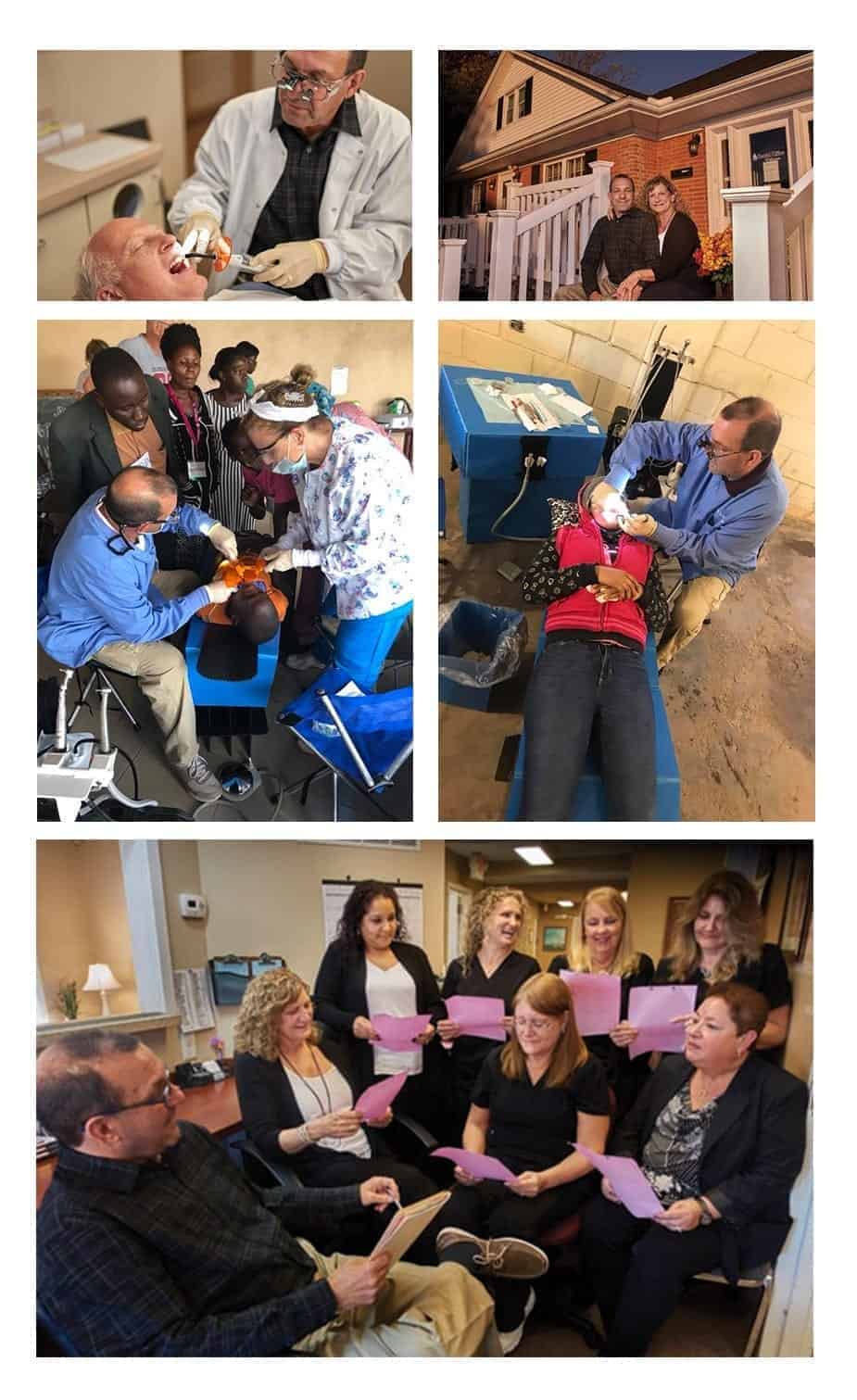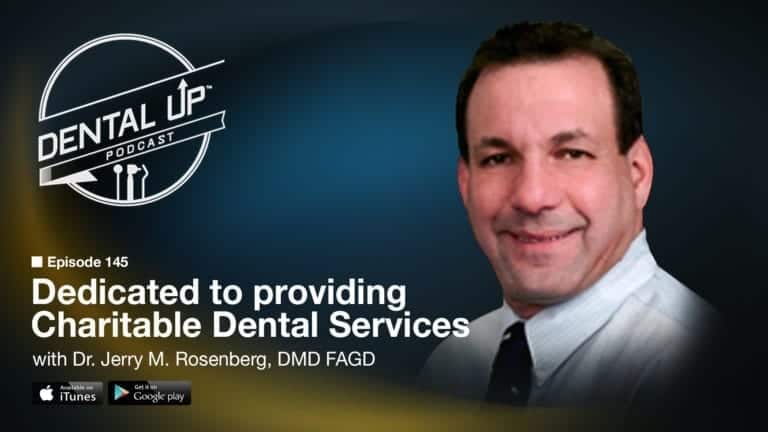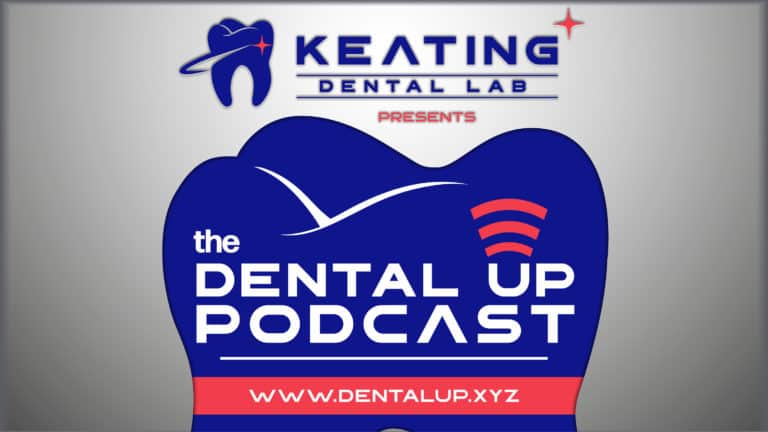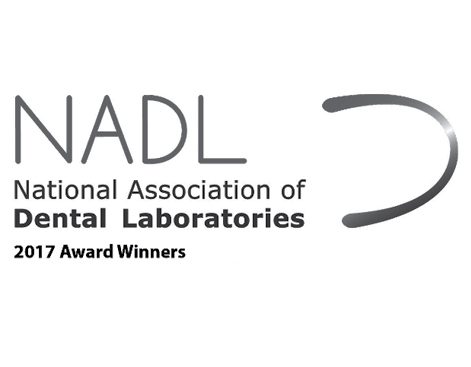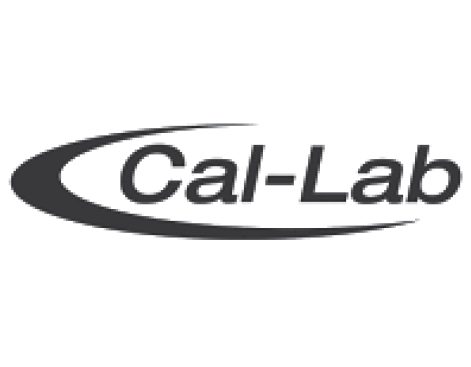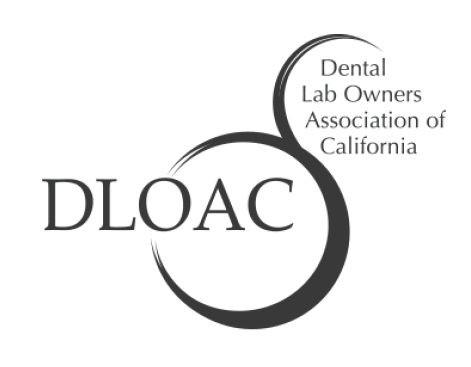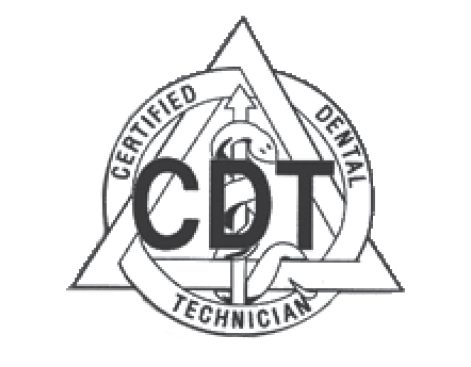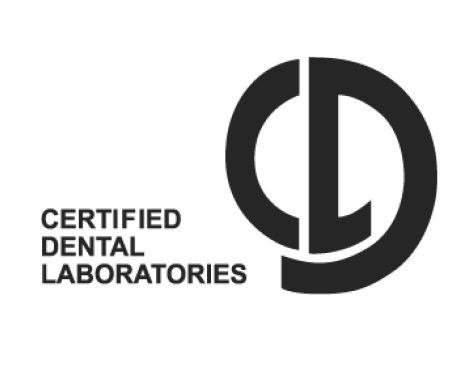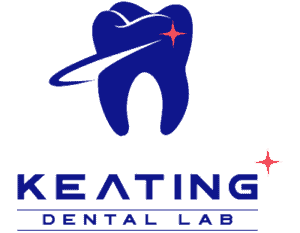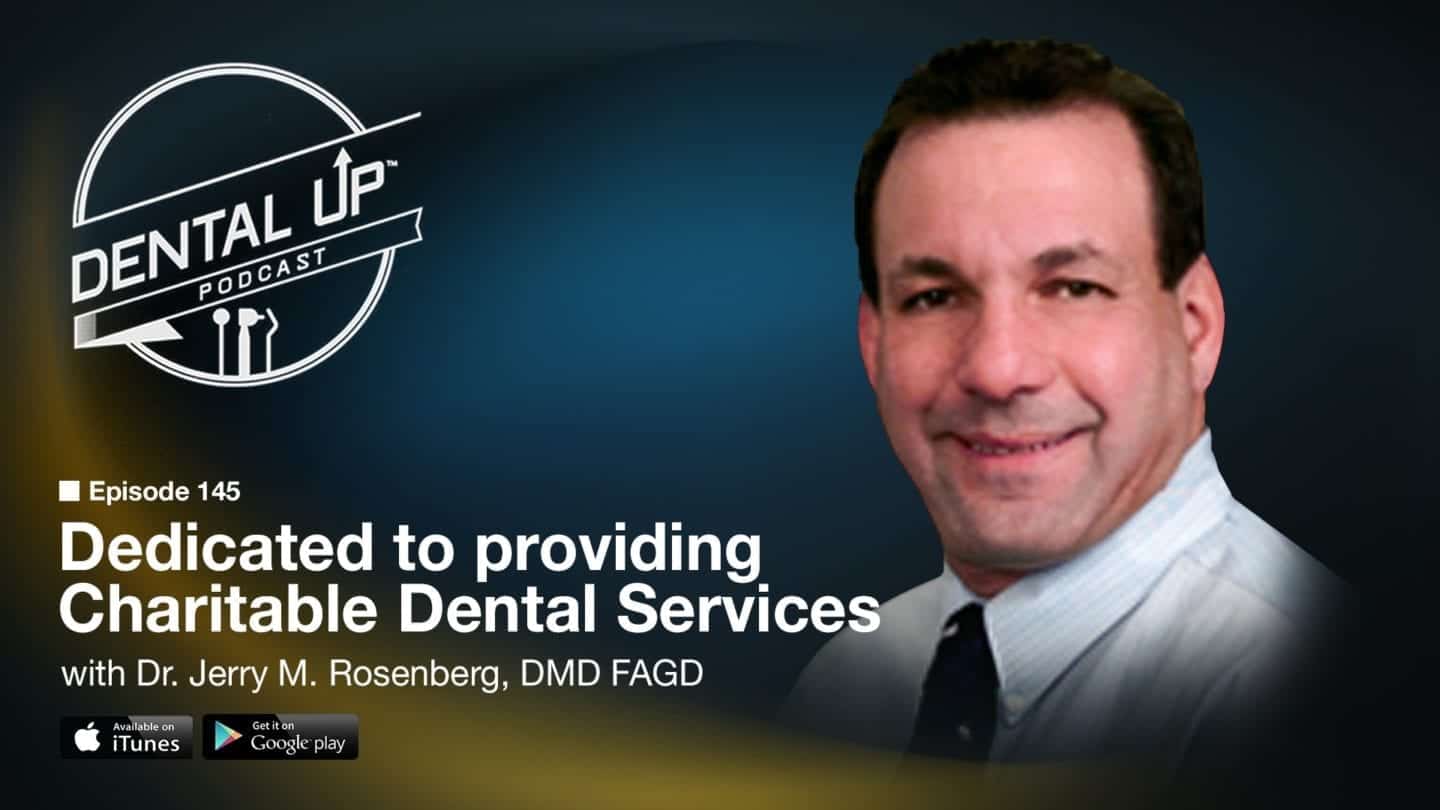
![]()
![]()
![]()
![]()
![]()
On this week’s episode of the Dental Up Podcast, we sat down with Dr. Jerry M. Rosenberg, DMD FAGD and chatted about the powerful and positive impact of providing charitable dental services to both your local community and those abroad.
In this episode you will hear about:
1. Getting to know Dr. Rosenberg and what inspired him to get into dentistry.
2. How Dr. Rosenberg got involved with this charity work.
3. How being involved with his local community helped him better understand his patients’ needs.
4. How he maintains a strong team in his practice.
5. What his marketing strategy comprises of.
[bg_collapse view=”link” expand_text=”View Full Transcript” collapse_text=”Hide Transcript” ]
Host: Ladies and gentlemen, this is the Dental Up podcast, brought to you by Keating Dental Lab, a full service, award-winning dental laboratory. Each week you’ll lean tips and techniques from real world dentists bringing you in depth interviews, motivating stories, current events, and sports. Here’s your host, Shaun Keating.
Shaun Keating: Hey everyone, Shaun here and welcome to another episode of the Dental Up podcast. Our guest this week received his undergraduate degree from Rutgers University and completed his dental degree at the University of Pennsylvania. He has been involved in Jamesburg Monroe Township activities for over 30 years and is the 2018 Townie Choice Award cover winner. Currently practices from Jamesburg, New Jersey. Please welcome, Dr. Jerry Rosenberg, DMD, FAGD. How’s it going, Dr. Rosenberg?
Dr. Rosenberg: It’s going fabulous. Thank you so much for having me on.
Shaun Keating: That’s so cool dude. I loved it, man. Last month I open up the Dentaltown and I’m going, “Hey, Dr. Rosenberg. I know that guy.” That’s just so cool that you got the cover of Dentaltown. Man, you made it. I had that a couple times myself back in the day and great things happened after I was on that cover. I think great things are going to happen to you. You do a lot of great things in this industry and we’ll get on this. I know we’ve got a short one today, but dude that’s just so awesome.
Shaun Keating: Hey, I always start off talking a little bit talking about sports. You get any of those football games out there in New Jersey last week? You watch those Rams play or the Saints? Any of the teams you like out there?
Dr. Rosenberg: Here in New Jersey, where my practice is, we’re kind of halfway between New York and Philadelphia. We have a lot of New York fans, we have a lot of Philadelphia fans, but those games were just awesome last weekend. Two overtime games in one day.
Shaun Keating: Exactly.
Dr. Rosenberg: How crazy is that?
Shaun Keating: How right were they? Number one, number two, number one, number two in both the leagues, played each other and they came down to overtime, so yeah. It was real exciting to watch those games man.
Dr. Rosenberg: I’m glad I wasn’t that referee who blew that call though. That was terrible.
Shaun Keating: That’s going to stay around for a while.
Dr. Rosenberg: But that’s part of sports.
Shaun Keating: Yeah, it is. A lot of things in different … You don’t remember them after a few years, but this might stick for a while. I mean it was a pretty heavy duty penalty. It wasn’t called, but anything could have happened. You can’t just say that one play. They might not have scored. They might have still did a field goal. But who knows? I’m okay with it. I’ll live with that. Yeah, Philadelphia. I thought they were going to have it. I really liked Philadelphia and I like the whole quarterback thing. You know, they’ve got that Carson Wentz and they have this Nick Foles that they just, he’s the back up and this other guy’s still a quarterback. This guy took you to the game almost two years in a row to the Super Bowl and won it one year. I don’t know. I think Nick Foles is going to find himself a great job out there if not with Philadelphia next year.
Dr. Rosenberg: He definitely has magic going on.
Shaun Keating: That’s awesome. Let’s dental up now. I always like to start off talking at what point in your career did you think, “I want to be a dentist?”
Dr. Rosenberg: During high school I started thinking about it and doing a little research on it and when I went to college at Rutgers, decided to do a little intern, externship at a local hospital in JFK Medical Center and spent a couple days there. One afternoon a week for a couple years, just to look and see what dentists do and what the average day of a dentist was. One summer I helped a dentist up in our area, full-time as an assistant. I really just wanted to get in and see what dentistry was about. One of the things I really liked was the idea of being your own boss. Being able to determine what your life is going to be like and what your day is going to be. That attracted me. I like to do hands on, so, basically during college I became heavy into the idea of becoming a dentist. But you really need to go into an office and really see what it’s like and that’s something I recommend to people thinking about dental school. Spend some time in the industry to know what it’s like.
Shaun Keating: What was Pennsylvania like? I got a lot of doctors from Pit. Is Pit close to Pennsylvania in the colleges or no? Total different areas of Pennsylvania?
Dr. Rosenberg: Yeah, Pittsburgh is out in west Pennsylvania whereas University of Pennsylvania is right in Philadelphia. In west Philadelphia, smack in the middle there. I got accepted to a number of dental schools, but my dad had gone to work when he was in college and so I had an infinity for University of Pennsylvania and decided to go there. Penn was great, but thinking back on Penn, that was back in the days of D. Walter Cohen and they were just very big into perio and back then, we would try to save anything with two sharpie’s fibers on it. Just by doing periodontal treatment. Things have definitely changed with the advent of implants now. When implants came about we had to change our mindset and try and save every periodontally involved tooth.
Shaun Keating: Oh, I know. I got this one doctor, he was a periodontist and he just believes in perio stats, the life saver, but they’ve got to take a pill every day, the rest of your life. How’s that really work in perio patients? Is periostat the holy grail of perio? Or no?
Dr. Rosenberg: It’s not going to hurt anything, but it’s an adjunct, just like all of the other adjuncts and perio. Obviously the biggest thing for a perio patient, for them to be invested in what they’re doing. If they’re not invested in doing the work at home. But the ones that do invest, those are the rewarding ones. When they come in for their recall and their gums are pink and tight. It gets me so excited that we’ve made their mouth a much better place.
Shaun Keating: Absolutely. No, it’s important for them to realize that. I’ve seen a lot of people with some loose teeth, man. You can go in there and almost pull them out. It’s like dude, that’s just kind of crazy. Okay, tell me a little bit, when you got out of college, you start off as an associate? Did you purchase a practice? Tell me a little bit about that if you could.
Dr. Rosenberg: I started out as an associate in Jamesburg New Jersey. Jamesburg New Jersey is a cute little town one mile, one square mile in parameter and I started there right out of dental school and I worked as an associate for another dentist in town. After about two years I just got the feeling that I wanted to have my own practice. Two years after dental school, I had met my wife, Vicki. We got married and we found a house on one of the best corners in town and in fact, we got married right in that house and we opened up a home office three years after I graduated from dental school. I just wanted to get into being my own boss and having my own practice.
Shaun Keating: No kidding. That’s awesome. Man, your wife’s a real go getter and kind of a business mind behind the practice. I have quite a few dentists with their wives that one does the business part of it and the other one does the dental part and it seems to work out real well for most of the people that I’ve encountered that have done it that way. Your wife’s a real backbone to your practice, huh?
Dr. Rosenberg: There’s definitely a partnership between the two of us and we definitely compliment each other. She does most of the design work, in designing the layout of the practice when we built it originally and then we did a renovation back in 2005 and she designed that. She is the person who makes the facility run, the building, taking care of all the maintenance. It’s a good compliment to what I do.
Shaun Keating: That’s so awesome. Yeah, I got my wife does the same thing at home. I can’t change a light bulb. She’s sitting there … She takes care of all the business, hires the plumbers and everything else and I’m just the knucklehead that knows how to make teeth. But it’s worked out 36 years, same like you. That’s just awesome dude. Tell me a little bit about the layout of your practice. How many ops do you got working and tell me a little bit about your staff. How many hygiene, stuff like that.
Dr. Rosenberg: Sure. We have four operatories. As I said, we started out in 1986 with a home office which was, we loved a lot, being able to as you’re just building up a practice and you only have maybe half a day or two thirds of the day of patients. Then I can go in and see my kids and spend time with the family. Then in 1995 we moved out and made the whole building into a dental office, so we have four operatories, about 2,000 square feet and just very comfortable. As I said my wife did a great job in designing the flow of the office. I love the flow of the office. The staff? We have a full-time hygienist Joanna and a part-time hygienist Sheryl. The staff, I think is one of the best parts of my practice. All my patients come in and say, “Your staff is just so helpful.”
Shaun Keating: That’s nice.
Dr. Rosenberg: Lila, my dental assistant, she’s been with me 18 years, and the patients come in and if I walk into the operatory first, they’ll say, “Where’s Lila? Where’s Lila? I want to talk to Lila today.” Debbie is our scheduler. Debbie’s job is to keep me busy and deal with our patients and help them try to get an appointment that works for them. One of the big things about our patients is the area that we’re in, there’s about seven or eight communities of people 55 and over. A lot of our patients are mature patients. I’ve got patient’s up to about 103 years old.
Shaun Keating: That’s awesome.
Dr. Rosenberg: Every day I treat two or three patients in their 90s, every day. Very interesting work and some very interesting dentistry of problems come up that you need to try and problem solve.
Shaun Keating: Oh, I’ll bet dude. What about getting wise guys out there, man? The soprano brothers or any of those guys?
Dr. Rosenberg: My wife and I met one guy, he said he was a wise guy in a restaurant once. I’ll never forget that story. He wanted to come see me as a patient. I said, nah, that’s okay.
Shaun Keating: Yeah, I know. So crazy. That’s actually real. I go to Chicago every year for the mid winter and I remember probably 20 years ago going and meeting my wife. We were in the … It’s called the Rosebud, and it’s this little Italian place and there was actually some guys that were total mobster guys. Like eight of them at their table. That was back when you could smoke in a restaurant, and the one guy, they were dressed to the nines, I mean so nice. The one dude’s hat pulled out the newspaper and goes, “Look it man. I’m in the paper today” and there was writing up about this racketeering lawsuit or something. It’s just crazy. It’s real. We had to wait like an hour and a half. This was the first time we ever went there. We had to wait to get in there. We waited at the bar and then we finally sat down right by these guys, man. It scared you straight man. I was like yes sir, no sir. It’s so nice, but it’s kind of crazy. Tell me a little bit about what are some of your favorite procedures you like doing in the practice? You like doing full re-adds? You like doing onesie twosies? What’s your go-to procedure when you’re working mostly?
Dr. Rosenberg: My favorite procedure these days, we love to do implants. Implants are just such a great service to patients. You know where it’s titanium, you can’t get decay in titanium. The predictability of implants and the predictability of zirconia and eMax also. What excites me these days compared to when I started dentistry is because of the digitization of dentistry, between the scanners and the milling machines, the fit of this work is just so awesome.
Shaun Keating: Exactly.
Dr. Rosenberg: Whether it’s implants, whether zirconium or eMax-
Shaun Keating: It’s amazing.
Dr. Rosenberg: … Back in the days when we used to use porcelain fused to metal and you had to worry about the porcelain chipping or the fit of the porcelain and stuff like that. I mean, you guys see it from your end, the ability to insert a crown or insert work, I’m just so excited about the fit.
Shaun Keating: Oh, I know.
Dr. Rosenberg: It has to do with-
Shaun Keating: And the breakage where like you said, because we’re about the same time in the industry and it’s such a relief just like you said. We still do a ton of PFM’s and we’re pretty damn good at them. You really got to have everything dialed in. There’s a lot of moving parts to it, but you get a little flex here and there and that’s popping like a tin can. You’re popping porcelain where this monolithic and some of the newer zirconias that we’re doing and milling, there’s no breakage man and the fit, like you’re saying and when we’re doing digital there’s no variables man. It’s just right there. I can do a cement gap. Whatever I want and microns on the cement layer and everything else. It’s just so amazing and just a lot less stress man. I’ve got a lot of gray hair in my early career by just trying to get this stuff to work man. That is just, that is so neat. Now what about, do you, are you [shinking 00:13:35] implants? Are you working with an oral surgeon? Or do you do your endo? What do you send out and what do you like to do in house?
Dr. Rosenberg: I mean, as far as root canals, I love to send them out because again, the technology these days. You can’t beat an endodontist who has a CBCT and has a scope and so your not just a success rate. For my patients I want my success rate to be as high as possible. Having an endodontist do the root canals are … That’s just my way of going. Implants? I love to restore implants. Whether it’s a single tooth or an align-four or bridgework. I do use local surgeons and again, the ability for them to use a CBCT and get that in the right place to make my job easier. It’s just the way to go.
Shaun Keating: Oh, absolutely. I see that more and more with a lot of dentists that are successful that have peace of mind, that sleep well. They do what they do best and they let the other guys do what they do best and you’re still crushing it. You’re doing a ton of work and I just think that’s a good logic. I know you’re in a small town there. What is it? One square mile long? I’m in a similar little town, but you’ve got like five dental practices around you and it would seem like it would be tough for business, so what are you doing for your marketing strategy and your mailer, your social media. What are you doing to drive patients to your practice that helps you stand out? It’s just the longevity of you being in town or what do you do there to drive some patients to you?
Dr. Rosenberg: We’ve been there for 32 years and so the way we started out was community involvement. At that point my wife and I and our kids, we lived town, and we built a practice on being involved in the community. We were involved in the soccer club there for many, many years. I was on the board of education, and my wife was on committees for … We had the 100th anniversary of Jamesburg. She helped on that. We started building the practice on community involvement and internal referrals because we find that internal referrals are the best referrals that you can get, and I think our biggest referral I get as I said is our staff. People just love our staff. Staff’s so friendly, they care about our patients. Some of our patients who are senior citizens and they may need a little more TLC and the staff helping them with it. That’s the way to go.
Dr. Rosenberg: Obviously, these days, your online presence for the younger generation is a big thing, so we’re working on our online reviews and I still get patients who haven’t seen me in 10 years. They’ve moved out of town, they move back or they have decided to go to another dentist and they’ll come back 10 years later and I’ll see patients that haven’t been in the office for 10 years, 15 years. All of a sudden they’ll decide to come back and see us. Their insurance changed and now they want to see us and they know we’ll do a good job for them.
Shaun Keating: That’s so awesome and I hear that more and more. The most successful practice is the ones that have had their staff with them a long time. It’s so important, just from consistency, even in the football arena with Super Bowl teams. They’ve been together a long time. Look at Brady and Belichick. It’s just a cohesion that you have and when you have your staff together so long and they treat people good. That’s just the biggest thing. Kind of the golden rule. Treat people good, the referrals you get is going to be your number one marketing for your practice and I was just reading something today, and it was just something like the number one service fast food place out there is Chick-fil-A and they don’t work on Sundays, it’s a religious thing and all that. There’s a big thing, the Super Bowl on Sunday and Chick-fil-A won’t be open inside the stadium. But you know what they’re doing is they trained their people and management. They try to really stress please and thank you with all their workers. They do that over and over with them and just the please and a thank you in a conversation with people goes so far and just being nice and people see that and they want that. Especially in this day and age.
Shaun Keating: A please and a thank you. It sets you above and beyond all the other competition out there. In the food industry. I’m sure it’s in any industry to treat people nice and it’ll come back to you.
Dr. Rosenberg: Two things the other practices don’t do, if somebody needs to go see a specialist and sometimes they’ll call a specialist, and they won’t see … You’ve got a patient who’s in pain, needs a root canal, and our job is to get on the phone and make sure that patient gets over there, gets in in a timely manner. If they need to get an extraction from the oral surgeon, they get in in a timely manner. If they’re 93 years old and maybe we need to discuss their treatment with their children, you know, spend some time on the phone with their children and go over what the options are so that they’re well taken care of. You try to do some things to help their experience and to move it forward. I just was on the phone with a lady in France whose father is in Jersey here and I had to discuss the case with her in France and what we’re going to try to do for her father here who is just a wonderful person, but sometimes they need a little help from their family and what should be done with them.
Shaun Keating: Absolutely. That’s so true and it just goes so far. But that’s so cool. I know you, it’s a real big thing for you. I know you’ve been working in Uganda the last few years and you have this dental mission that you’ve been doing and you’re spearheading another one this year in 2019 and I want to put things on our show notes that maybe there’s a link that can … because I know you’re real passionate about that and just going out there and doing what you’re doing and even if there’s some dentists that might want to get on board and help you out with some of the trips going forward. We would love to help you and even too, us as a dental lab, if I can help with some denture teeth or whatever. I’m not sure because I know it’s all on media. It’s a lot of extractions, a lot of different things. Tell me a little bit about how you got involved with that and tell me about what’s coming up for the New Year with that.
Dr. Rosenberg: There’s a church in town here where I live in Forked River, the Forked River Presbyterian church and the pastor there, Dr. Terry Chapman, he had visited in Uganda, our contact there, [Caleb Recrundo 00:20:21]. Caleb Recrundo has been running two orphanages for about 10 years and about every two years Dr. Terry Chapman would go over there and visit and when my wife and I got involved in the church, Terry found out I was a dentist and brought up the idea would I like to come over and try to help Caleb with the kids. There are some dentists in Uganda, but Caleb has about a hundred kids and he just really can’t afford to take them all to the dentist. He would only take them if something was maybe life threatening. I told Caleb and Terry I really didn’t know anything about running a mission, but I would like to help out. I spent about nine months researching the topic and talking to other people in America and luckily there were people in America who had done missions before. Obviously a lot of missions and studied what I needed to do and figured it out and we went over in July.
Dr. Rosenberg: We had a team of 12 people who had different abilities to do different things. We had a school nurse, we had a teacher. We had an engineer. A pharmacist, a pastor, a psychiatrist, and we went over and treated these hundred kids and also some people in the community. What we found when we went over there was we really bonded with the people and these people really became our friends. The children became our friends, and the staff there, Caleb and his staff. Just an awesome thing and just a feeling of trying to help people. Oh, my God. It gets me emotional now.
Shaun Keating: Oh, I bet. No.
Dr. Rosenberg: Helping these kids. Caleb just does a wonderful job over there with the kids. So, we went over there with a team and we brought portable equipment. We worked off a generator. I decided I wanted to screen all hundred kids and see what needs that they had. Turned out that about a third of the kids did not need any treatment, which it’s showing that Caleb is doing a very good job over there. He’s really taking care of the kids and the kids aren’t really just going downhill with their teeth. A third of the kids did not need any treatment, and we ended up doing about 40 extractions and about 40 fillings. Using sodium diamine fluoride which is a new fluoride out there that helps slow down decay and it was just an awesome, awesome trip. One story I like to tell is a story, there was one young girl, Grace. Was about 18 years old. She had a front tooth that was broken because of some abuse during her life and the tooth had to come out. We told her the tooth had to come out and she started crying and saying, “Nobody’s going to love me. I won’t have a front tooth.”
Dr. Rosenberg: Obviously she was talking about getting married and some boy loving her. She was just very upset over it. My wife talked to her and said, “You know what? We’re going to try to help you out.” My wife left Caleb some money when we left. We didn’t have enough time to make a tooth there. We didn’t have a lab.
Shaun Keating: I was going to say, that’d be tough.
Dr. Rosenberg: It’d be tough. We left Caleb a couple hundred dollars and said, “Bring her to a dentist.” Caleb waited a month or two until the socket healed. Brought her to a local dentist. They made her a little flipper at least for now. Two months later they sent us a picture with Grace just smiling. Smiling from ear to ear.
Shaun Keating: Aw, that’s so awesome.
Dr. Rosenberg: And she’s happy and Caleb said her life has changed because she’s just coming out of her shell and just a beautiful person.
Shaun Keating: That’s awesome. I love that, you know and I was going to say because you go like 10, 12 days and if you could like get it when the first two, three day, I don’t know what it is to get something to Uganda, but I get stuff all over the world, but if we could get it to where even if you have something six through 11 or whatever the first two, three days, get some impressions, get them overnighted or second day and I’ll do them in a day or two and send them all back to you. We could do something like that maybe because I can get stuff all over man. I can get thing second day to Japan. It’s just something that, yeah, if you see something, or maybe you see something and plant a seed so maybe the following year or something we could really generate it or look at that. You never know. Whatever how we could help, but not looking at some of your top five products that you talked about and stuff, tell me about this varnish. It’s like a Colgate Prevident Varnish. What is that? How does it work and tell me a little bit real quick on that.
Dr. Rosenberg: It’s a varnish in the days when I came out of dental school, we were using the regular fluoride. The varnish just does a better job of getting the fluoride into the tooth and cutting down decay. I mentioned that a lot of my patients are older, and we may have some patients who are in their 80s and 90s who their hygiene is not where we’d like them to be. Not through any fault of their own, but their dexterity, some of them, as they get older, their dexterity is not what it was when they were younger. Especially not just for young people for sodium, not for some, the varnish. We use it for seniors, and we find it a great service in trying to cut down decay as they’re getting xerostomia later in life. Just a wonderful product. My hygienists Joanne and Sheryl really love it.
Shaun Keating: That’s so neat. Is it like a sealant is it? Or no? It’s just like a-
Dr. Rosenberg: It’s more like a fluoride and a covering that tries to get fluoride to come down into the enamel and make the enamel stronger plus cut down on sensitivity. A lot of them have sensitivity on teeth.
Shaun Keating: That’s what I had. I had some abrasions on like two and three of the genital aspect on the facial just from brushing too hard and it got sensitive. They went in and put some of that varnish on there or something and no more sensitivity is. It’s pretty neat stuff, man, but I just noticed that and then one other thing, I noticed you do some team huddles? Is that weekly or is that daily? Tell me a little bit about that on your office.
Dr. Rosenberg: We have a huddle every morning. Before the day starts to plan out our day and talk over patients and I think if an office doesn’t do that, that’s something they really should do. As I said, with our elderly patients, we may have particular things that we want to know about, whether they need help getting into the chair or concern that maybe some family member brought up. It’s just a quick meeting in the morning and discuss what the day’s going to be. I also like to have some control over my schedule so if we have some emergencies, we’ll discuss where to put the emergencies. I don’t like the idea of telling patients if they have an emergency they have to come in next week. If anybody wants to come in, they’re going to come in today. That’s just what we need to do as healthcare providers.
Shaun Keating: Absolutely. That’s so awesome that you do that. Heck, I had it where a friend needed a root canal and I talked to my dentist and he didn’t have the pull to the endo guy because he’s probably not as close as he should be and I think it was three or four days out before he could get you in. That’s not right. You’ve got to have some pull, baby. Treat your associates good, treat your people good and treat your referring specialists good and they’ll take care of you for sure. Heck, doctor, I can’t thank you enough. I know you just had a half an hour at lunch. You got to go back and cut us some more crowns. How we doing as a lab? We doing okay, our crowns fitting and doing good?
Dr. Rosenberg: They’re doing wonderful.
Shaun Keating: That’s awesome.
Dr. Rosenberg: One of the things, reasons I started using you guys is the personal care. I had seen an advertisement where it discussed that you’ll have a dedicated person to work just with us and some of the other labs, you’re just a number of a very large lab and for my patients, I want somebody that I can give up a call and tell them exactly what I need to do and know what my tendencies are. I think it’s going great so far.
Shaun Keating: Aw, that’s so awesome. We try to do that. We try to be that little one-man lab. You have the same [inaudible 00:29:12] and same people you can talk to as management, but same techs working on you and then we get to know your wants and needs and how you like your profile set up. When it comes to [inaudible 00:29:25] profiles, I mean everything and it’s a neat thing. But, Dr. Rosenberg, man, I can’t thank enough. Congratulations on getting on the cover of Dentaltown and you have a great story. If we can help anything with your trip out to Uganda, helping out, please let us know. I know some people out there might be able to help also and even if there’s some vendors out there with some equipment and some supplies. Let’s try to get it the biggest trip out there this year and help those guys out. Whatever we can do to help you, we’d love to do it. Again, thank you for coming on the Dental Up podcast and God bless you and your family and we can’t thank you enough.
Dr. Rosenberg: Thank you very much and we’ll keep in contact about the next trip and there may be some dentists out there who want to experience a trip. It’s the trip of a life time and just a life changing trip. The other thing we’re doing that some people might be interested in is once we’ve got their teeth done, we were looking at the next area to try and help them. The biggest thing in trying to get people out of poverty is education. Once their healthcare needs are taken care of and their food is taken care of, you want to break the cycle of poverty. What we have just started with a sponsor program where people can sponsor the education of one of these hundred kids. A hundred and fifty dollars a year sponsors a kid to go to school for a whole year. The schools there are not free. But $150 compared to what you and I paid for our kids to go to college or whatever we pay in property tax.
Shaun Keating: I’ll have to support like 10 kids at that price. That’s pretty awesome and then also, I knew you guys were doing the fluoridation or the water systems for the clean water. What do those run and how does that work? I just think that’s the neatest thing that there’s some little kits that you can get clean water. How does that work?
Dr. Rosenberg: These water filtration units, we brought 50 of them over that we purchased in America and what happens in Uganda is water there is just not very clean. Because that’s a life expectancy, the expectancy basically is about 48 years because of what’s going on over there. We can’t fix the whole world, but we can try to do something for a small part of what we can do. These water filtration units are very simple. They’re just a filter that you run water through. It goes in one end, comes out the other, clean water and part of our team while we were doing the dentistry, as I said, we have 12 members of the team. Six of the members were helping with the dentistry and the other members were going out in the community outside of the orphanages and dealing with some of the local people and giving them these water filtration units and telling them how to use them. Helping their life expectancy and helping their health.
Dr. Rosenberg: The other last neat thing I’ll tell you about is we did bring over one of our 12 team members was a former high school football coach. He wanted to go over there and I know you’re big into football. He spent three days training a bunch of the kids there to play football and football’s not an easy game to teach, but we ended up with a football game. An American football game, not soccer. So, that was pretty neat too. The kids really enjoyed that.
Shaun Keating: We got to do some scouting. We might see some kids that are like split-jean, ready for being a defensive tackle or who knows? We’ll bring them over to America. Be on the Rams. We’ll have to set up their college career. We’ll do that for sure. Real quick on those water filtrations, what do those cost, just a guesstimate about. I’m just kind of wondering. You brought 50 over. How much you think they run about each in America to buy?
Dr. Rosenberg: The retail cost was $50 a piece. I said we brought 50 of them, but I was able to, through a contact who has done … Another dentist. His name is Dr. Gill [Cheatwood 00:33:43] out of California. He does three or four missions a year. Just a wonderful person. Because he does so many missions, he contacted the president of the company that manufactures the water filtration units and this is one of the good things that’s happened to me over the years trying to help this mission, is I was able to get 50 of them for $13 apiece.
Shaun Keating: Oh, dude, that’s so awesome. Let’s try to do that this year. I’d love to help out myself from our laboratory just to help out. Let’s get a couple hundred of those especially at that price if the guy is up for that. Let me know. I’d love to get them water man. I mean you’ve got to be able to drink water, dude and that’s just the basics. Good for you man. God bless you on that and I just appreciate hearing that and dentistry’s a platform for us that if we can use it to help fellow humanity, let’s do it. But good for you, man. It’s great talking to you on this podcast and again, thanks for everything and we’ll talk to you real soon.
Dr. Rosenberg: Thank you for having me on and thank you for listening to me and it was a lot of fun. I appreciate it.
Shaun Keating: Alright Dr. Rosenberg. Alright sir. Bye, bye.
Host: Thanks for joining us on the Dental Up podcast show this week. Make sure to follow us on Facebook, Instagram, and Twitter. Or search the Dental Up podcast on iTunes for our weekly feed. Don’t forget to visit keatingdentallab.com/promo for exclusive offers. Keating Dental Lab is a full service dental laboratory and we’re nationwide. We’d love for you to send us a case so we can show you the Keating difference. If you dig what you heard, please leave a review on iTunes and we’ll be back next week.
[/bg_collapse]
For more information on Dr. Jerry Rosenberg and his practice please click here to check out his website: https://drjerryrosenberg.com
For those who are interested in Dr. Rosenberg’s mission can email him at jerryrose1@comcast.net. The mission will accept supplies, donations, and even willing new team members.
